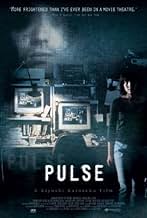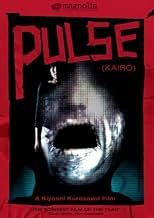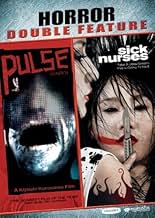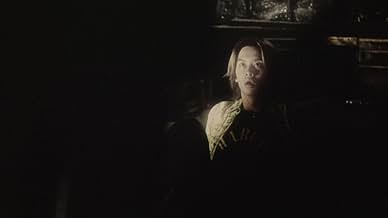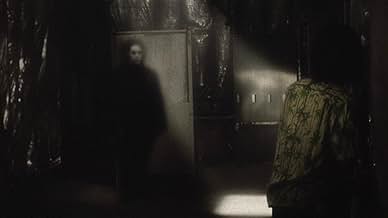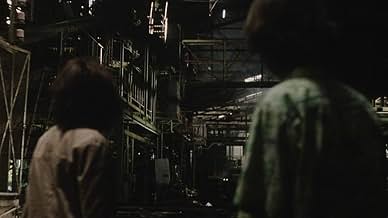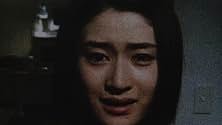Zwei Gruppen von Menschen entdecken Hinweise darauf, dass Geister versuchen könnten, über das Internet in die menschliche Welt einzudringen.Zwei Gruppen von Menschen entdecken Hinweise darauf, dass Geister versuchen könnten, über das Internet in die menschliche Welt einzudringen.Zwei Gruppen von Menschen entdecken Hinweise darauf, dass Geister versuchen könnten, über das Internet in die menschliche Welt einzudringen.
- Auszeichnungen
- 3 Gewinne & 3 Nominierungen insgesamt
Empfohlene Bewertungen
A group of young people in Tokyo begin to experience strange phenomena involving missing co-workers and friends, technological breakdown, and a mysterious website which asks the compelling question, "Do you want to meet a ghost?"
Director Kiyoshi Kurosawa spent years working in the world of "pink" films and direct-to-video movies. He was at this time best known in the west for "Cure" (1997), though it was "Pulse" that would make him an international sensation. Assisting him is cinematographer Junichiro Hayashi, known for two other J-horror modern classics, "Ring" and "Dark Water".
"Pulse" was released at the right time for American audiences to latch on to. The American version of "The Ring" came out in 2002, and sparked a wider interest in Japanese horror, kicking off a wave of remakes. This also helped get the originals a wider distribution in the States -- "Pulse" being among those, as well as "Audition" and many of the Takashi Miike films that had previously been very niche.
Kurosawa uses this film not just to tell a good ghost story, but to explore "the horror of isolation" in a world of increased inter-connectivity. With its dreary, depressing color palette and empty space, we find this story about the Internet to truly be about loneliness. Whether intentional or not, it is a clever social commentary that may be more true today (2017) than it was at the time.
Some early reviews were critical because the film is heavier on style than substance and the narrative is not completely coherent. But since then, praise has only grown. In 2012, Jaime Christley of Slant magazine listed the film as one of the greatest of all time. In the early 2010s, Time Out conducted a poll with several authors, directors, actors and critics who have worked within the horror genre to vote for their top horror films. "Pulse" placed at number 65 on their top 100 list.
The Arrow Video Blu-ray is a fine package and a great excuse to re-visit this film. Contents include (but are not limited to) new interviews with writer/director Kiyoshi Kurosawa (at an astounding 43 minutes!), actor Show Aikawa and cinematographer Junichiro Hayashi (24 minutes); "The Horror of Isolation", a new video appreciation featuring Adam Wingard and Simon Barrett; an archive 'making of' documentary, plus four archive behind-the-scenes featurettes.
Director Kiyoshi Kurosawa spent years working in the world of "pink" films and direct-to-video movies. He was at this time best known in the west for "Cure" (1997), though it was "Pulse" that would make him an international sensation. Assisting him is cinematographer Junichiro Hayashi, known for two other J-horror modern classics, "Ring" and "Dark Water".
"Pulse" was released at the right time for American audiences to latch on to. The American version of "The Ring" came out in 2002, and sparked a wider interest in Japanese horror, kicking off a wave of remakes. This also helped get the originals a wider distribution in the States -- "Pulse" being among those, as well as "Audition" and many of the Takashi Miike films that had previously been very niche.
Kurosawa uses this film not just to tell a good ghost story, but to explore "the horror of isolation" in a world of increased inter-connectivity. With its dreary, depressing color palette and empty space, we find this story about the Internet to truly be about loneliness. Whether intentional or not, it is a clever social commentary that may be more true today (2017) than it was at the time.
Some early reviews were critical because the film is heavier on style than substance and the narrative is not completely coherent. But since then, praise has only grown. In 2012, Jaime Christley of Slant magazine listed the film as one of the greatest of all time. In the early 2010s, Time Out conducted a poll with several authors, directors, actors and critics who have worked within the horror genre to vote for their top horror films. "Pulse" placed at number 65 on their top 100 list.
The Arrow Video Blu-ray is a fine package and a great excuse to re-visit this film. Contents include (but are not limited to) new interviews with writer/director Kiyoshi Kurosawa (at an astounding 43 minutes!), actor Show Aikawa and cinematographer Junichiro Hayashi (24 minutes); "The Horror of Isolation", a new video appreciation featuring Adam Wingard and Simon Barrett; an archive 'making of' documentary, plus four archive behind-the-scenes featurettes.
I don't want to give away anything about this wonderful, haunting film. If you liked "The Sixth Sense", "The Others" or "Ring", this will show you how those films pale in comparison. I felt my skin crawl so many times, and the movie has been haunting my thoughts for days now. I sincerely hope that a wider audience has a chance to experience this dark, beautiful film.
I'm an old horror buff. I've seen some of the more notorious stuff around (Salo, Cannibal Holocaust, Caligula,...), but they all more or less about visceral horror.
Which doesn't work if you helped slaughter a few pigs.
What does work? Psychological horror. Impending doom you cannot prevent. Things you can't see or understand, but that are there right in front of your face. Music that shouldn't be scary, but which lingers anyway.
It's a typical, slow moving J-Horror with an atypical idea behind it. That oblivion is actually preferable than immortality.
Gore doesn't scare me - but some ideas do.
Like i said - it made me squirm... One of the best horror movies ever made - for the patient ones.
Which doesn't work if you helped slaughter a few pigs.
What does work? Psychological horror. Impending doom you cannot prevent. Things you can't see or understand, but that are there right in front of your face. Music that shouldn't be scary, but which lingers anyway.
It's a typical, slow moving J-Horror with an atypical idea behind it. That oblivion is actually preferable than immortality.
Gore doesn't scare me - but some ideas do.
Like i said - it made me squirm... One of the best horror movies ever made - for the patient ones.
This film starts out well, doing all the right stuff. It had me going for awhile.
But it get's slower, and slower, and slower--not to mention murkier. It is one of those films that would have worked fine as a 90 minute movie--even with some flaws.
But , anyway, this film goes on for about two hours, long after the viewer's interest has begun to wander and you've started scratching your head, wondering exactly what is happening.
Toward the end it kind of degenerates into overly long scenes of people running around in blasted, derelict industrial buildings breathing very hard into their microphones and shouting uninspired, predictable dialogue.
Some things just aren't very dramatic. Longish scenes of people poking around in pretty much abandoned industrial settings looking for stuff and breathing hard into their microphones isn't dramatic.
By the end, we are working our way through a checklist of horror movie clichés in excruciatingly slow motion. Ancient horror movie clichés have to be executed with a certain cleverness, a certain panache, and perhaps a little inventive camera work/cutting. Some snappy dialogue, some attitude. Or maybe you just have to get them out of the way fast. That's not what happens in this film.
The premise is rather interesting, but some of the exposition kind of conflicts with the stated premise--unless the stated premise was a red-herring. It's hard to tell from what they give you on screen and the film didn't motivate me to try to figure it out.
So, nice idea, good start ... really, really slow, pretty much unimaginative ending.
Maybe if they had had a bigger special effects budget ...
But it get's slower, and slower, and slower--not to mention murkier. It is one of those films that would have worked fine as a 90 minute movie--even with some flaws.
But , anyway, this film goes on for about two hours, long after the viewer's interest has begun to wander and you've started scratching your head, wondering exactly what is happening.
Toward the end it kind of degenerates into overly long scenes of people running around in blasted, derelict industrial buildings breathing very hard into their microphones and shouting uninspired, predictable dialogue.
Some things just aren't very dramatic. Longish scenes of people poking around in pretty much abandoned industrial settings looking for stuff and breathing hard into their microphones isn't dramatic.
By the end, we are working our way through a checklist of horror movie clichés in excruciatingly slow motion. Ancient horror movie clichés have to be executed with a certain cleverness, a certain panache, and perhaps a little inventive camera work/cutting. Some snappy dialogue, some attitude. Or maybe you just have to get them out of the way fast. That's not what happens in this film.
The premise is rather interesting, but some of the exposition kind of conflicts with the stated premise--unless the stated premise was a red-herring. It's hard to tell from what they give you on screen and the film didn't motivate me to try to figure it out.
So, nice idea, good start ... really, really slow, pretty much unimaginative ending.
Maybe if they had had a bigger special effects budget ...
I love Takefumi Haketa's score - sometimes disquieting, sometimes sorrowful, but always lending substantially to the mood in the film. I love the haunting atmosphere that pervades the feature, cemented with scenes of desolation - empty buildings and streets.
I wish I had more concrete praise to offer.
There's a vague theme about not giving in to despair and loneliness, as such surrender is the real killer. This thematic content is stronger than any specific sense of narrative - which seems backwards, but here we are. For as much as the Internet is emphasized in one way or another, it's nothing more than a starting point for the plot. For as much as red tape is emphasized, it doesn't seem to serve any actual function in-universe, and therefore none in the plot. And because a few different ideas seem to be put forth, it's unclear why events transpire in the first place. The netherworld is the embodiment of loneliness, maybe? Ghosts want to pass into the real world from the netherworld - because the real world is inherently not lonely, maybe? Ghosts and humans can't coexist in the same space, maybe? Ghosts want to make friends, maybe?
I can abide narrative that is disordered, weak, minimized, or scarce - but I do generally require narrative of some kind in a movie, or some overarching unifying quality. Unless... is that lingering ambiguity the whole point? Is the lack of clarity about what is happening, or why, the other side of the coin to the looming air in the picture of nervous foreboding?
I've only seen a few other Kiyoshi Kurosawa features, but I greatly enjoyed those that I have. I began watching 'Pulse' with high expectations, and I'm sad to say I'm let down. I don't think it's outright bad, but I want to like it much more than I do. The great atmosphere and music keep the film aloft while deeply indistinct writing prevents it from achieving greater heights. Why, as if to accentuate the very difficulty I'm having - I note two blurbs from critics who, speaking from opposite perspectives, still had the same conclusion. Stephen Hunter, for The Washington Post, wrote a positive review in saying "'Pulse' is best enjoyed if it's not questioned too closely. It lives visually in a way it cannot live intellectually." In a nearly identical remark, Jeff Shannon's critical review for The Seattle Times observed "While it's rattling your nerves, 'Pulse' leaves your brain wanting more."
I don't know anything about ghosts, but 'Pulse' definitely exists in a liminal space between life and death. Or is that uncertainty also wholly intentional?
Obviously many other people have gotten more out of this than I have; I'm glad for them. Perhaps given more time and consideration I'll turn a corner and regard 'Pulse' more highly. As it is, much to my disappointment, I'm just unsatisfied.
I wish I had more concrete praise to offer.
There's a vague theme about not giving in to despair and loneliness, as such surrender is the real killer. This thematic content is stronger than any specific sense of narrative - which seems backwards, but here we are. For as much as the Internet is emphasized in one way or another, it's nothing more than a starting point for the plot. For as much as red tape is emphasized, it doesn't seem to serve any actual function in-universe, and therefore none in the plot. And because a few different ideas seem to be put forth, it's unclear why events transpire in the first place. The netherworld is the embodiment of loneliness, maybe? Ghosts want to pass into the real world from the netherworld - because the real world is inherently not lonely, maybe? Ghosts and humans can't coexist in the same space, maybe? Ghosts want to make friends, maybe?
I can abide narrative that is disordered, weak, minimized, or scarce - but I do generally require narrative of some kind in a movie, or some overarching unifying quality. Unless... is that lingering ambiguity the whole point? Is the lack of clarity about what is happening, or why, the other side of the coin to the looming air in the picture of nervous foreboding?
I've only seen a few other Kiyoshi Kurosawa features, but I greatly enjoyed those that I have. I began watching 'Pulse' with high expectations, and I'm sad to say I'm let down. I don't think it's outright bad, but I want to like it much more than I do. The great atmosphere and music keep the film aloft while deeply indistinct writing prevents it from achieving greater heights. Why, as if to accentuate the very difficulty I'm having - I note two blurbs from critics who, speaking from opposite perspectives, still had the same conclusion. Stephen Hunter, for The Washington Post, wrote a positive review in saying "'Pulse' is best enjoyed if it's not questioned too closely. It lives visually in a way it cannot live intellectually." In a nearly identical remark, Jeff Shannon's critical review for The Seattle Times observed "While it's rattling your nerves, 'Pulse' leaves your brain wanting more."
I don't know anything about ghosts, but 'Pulse' definitely exists in a liminal space between life and death. Or is that uncertainty also wholly intentional?
Obviously many other people have gotten more out of this than I have; I'm glad for them. Perhaps given more time and consideration I'll turn a corner and regard 'Pulse' more highly. As it is, much to my disappointment, I'm just unsatisfied.
Wusstest du schon
- WissenswertesTakashi Miike has said that this is the only film that has frightened him as an adult.
- PatzerRyosuke is typing in a numerical password to log in to his computer to watch videos on the dark web as shown on his screen. When it cuts to a shot of him typing on his keyboard however, he is pressing letters instead of numbers.
- Zitate
Ghost: Death was... eternal loneliness.
- Alternative VersionenRemade in America with the same (English) title, starring Kristen Bell, in 2006.
- VerbindungenEdited into Pulse - Du bist tot bevor du stirbst! (2006)
- SoundtracksHane Lay Down My Arms
Performed by Cocco
Top-Auswahl
Melde dich zum Bewerten an und greife auf die Watchlist für personalisierte Empfehlungen zu.
- How long is Pulse?Powered by Alexa
Details
Box Office
- Bruttoertrag in den USA und Kanada
- 51.420 $
- Eröffnungswochenende in den USA und in Kanada
- 7.250 $
- 13. Nov. 2005
- Weltweiter Bruttoertrag
- 319.233 $
Zu dieser Seite beitragen
Bearbeitung vorschlagen oder fehlenden Inhalt hinzufügen








